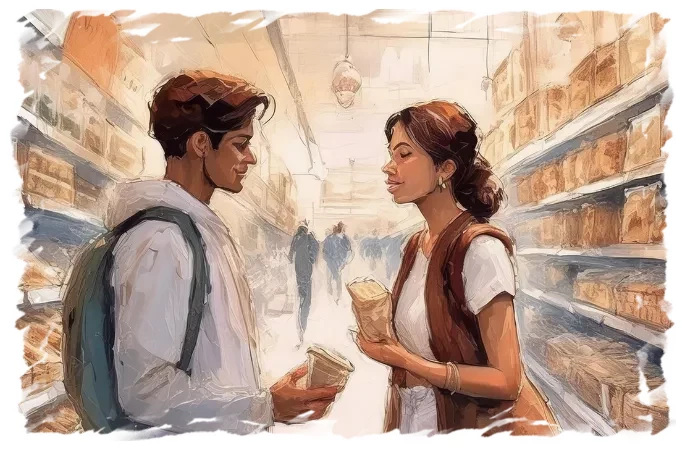I do not have walls around my room. Two sides always remained open, and two sides are occupied by the walls of the house in which the room lived peacefully. It did not worry me that all my secretswere laid bare, dissolving uncomplicatedly with each passing glare. It was welcoming. When thetimewas right, it also created a space for me to be me. All in all, I was happy in my roomwith no walls.
Three Ways to Say Goodbye
1.
Surbhi picked up her favourite crackers from a long aisle that looked back at her with colourful andgleaming packs of biscuits that came in mind-boggling flavours and offered beneficial nutrients. Afew of them even guaranteed a reduction of cholesterol in just 30 days, and some promised thesame amount of calcium as one glass of cow milk. For her, it was always the British cracker sandwichwith a rich cream cheese filling, packaged to attract the pensioners that did the job.
‘For my evening snacks,’ she thought, then muttered, ‘after five, the office does feel lonely. Theair feels a bit too chill’. Sitting quietly at her desk, hidden from the workaholics and the evening strollers, the roller skaters and the yawning window gazers, the daily passengers of overcrowded buses andcolleagues tip-toeing around the desk and monitors, she will munch on these biscuits to feel loved. The sweet, crunchy and silky smoothness of the biscuit goes well with a sip of black coffee withnosugar, making for a perfect companion.
‘Surbhi? Is that you?’ a familiar voice called, and before Surbhi could see what face harbouredthis familiar but strangely annoying voice, for she always hated interactions with strangers in public, shecould hear this person breathing.
‘Arjun!’ She shrieked involuntarily in surprise, ‘when did you arrive?’ the question followed. ‘It has been ten days,’ Arjun replied.
‘Why didn’t you call?’ a somewhat annoyed Surbhi asked in Arjun’s reply.
‘Don’t you remember?’ Arjun, in a mild nostalgic reminiscence,alluded, ‘We decided to deleteour contacts and messages, block each other and not even keep in touch through emails, remember?’
Surabhi felt caught, as if she was a child stopped before it could bring harm to itself. She softly spoke, ‘It was for the best. You needed to complete your PhD, and I…’
Arjun didn’t let her finish. He barged into her sentence and, with a force of suppressed emotions, said, ‘I know you love those biscuits,’ pointing to the packet of Royal Cream in Surabhi’s hand.
‘Since the day I arrived, I have spent most of my time going through these aisles stacked withbiscuits, but none of the shops had them until today, so I knew I would see you here.’
Arjun waited after completing his sentence. A few seconds of silence.
Surabhi put the packet of Royal Cream back into the aisle where she had picked it from, filling theempty space between the perfectly stacked packets of Royal Cream and then quietly walked awaywith Arjun from the long and narrow aisles of biscuits towards the exit.
2.
The March end wind, a melange of ragged warmth and puerile chill, brushed past the trees, througha forest that never stopped its low humming and grunting that sounded perfectly musical fromadistance but only until you came close enough to hear the chaotic rustling of every leaf, each tryingto survive, trying to last a day longer on the lifeless stem that didn’t hold them nor give any comfort. Alone amidst this foliage of green was hidden a brown rustic leaf, folding and twisting itself insuchaway as to expose the lush veins and venules. It was all a ruse to convince the other leaves that it still could do photosynthesis.
But the march wind did not care for plays and ploys. It shook both the green and the brown leaves alike, taking away the ones whose time had arrived. The brown one did see it coming, the foretellingof the long leave from the stem to the ground, where it must decompose and be part of the salt of the earth. The brown one thought, ‘It is all for the best,’ maybe it’ll hurt when the sudden jerk rips it away from the reality it had known for all its life, the stem, the physical metaphor of existence. But after that, ‘you are free’, it thought. On its own, the brown leaf would be a separate entity whichdidnot belong to the forest or the foliage anymore.
The brown leaf danced as it descended downwards, aiming for the green, hoping to be where it wassupposed to be, within the green. The delusional dancer knew no bounds. Its chaotic rhythmbaffledthe greens sitting on the branch and filled the greens on the ground with intrigue. Everybody wantedto be it, but at the same time, none of them dared to be it. The brown leaf performed its last trick, itslast Temps Levé.
The boy at the bench saw it land on the soft, muddy, dew-soaked grass. From a distance, he wondered about all the great possibilities that might have placed him there right at that moment just so he could experience this very insignificant event. A solemn silence transgressed as the lowgrunt of the forest kept on filling the boy’s ear with meaningless noises. Everything faded as he kept scratching the wooden armrest of the ageless bench. ‘How old was the tree when it had to takepart in the mass exodus of betterment,’ the boy kept thinking as he dug a hole in the bench, like a trenchfor little ants. ‘Is the tree still a tree after it was cut down to be made into a lifeless bench?’ thequestions were limitless and somewhat alright, he thought, for he wanted to keep his mind freeof the present and dwell in the questions of irrelevance.
And then he heard his aunt call, ‘Dhrubo! We are ready, come see your grandma.’ Dhrubo didnot want to turn or reply to any call, for he was still thinking about the tree and the brown leaf.
3.
The pervasive smell from the lemon he had during lunch remained on his hand, adamantly, determinedto vanish only when given the title of a fading memory and a place among his dearest memories.
It was midday, and Chetan had already had lunch a little earlier than usual. A simple Daal, Bhaat and Aloo Seddheo (lentil, rice & mashed potato). This was his way of coming back to his home, through food. No matter how many braised chicken thighs accompanied by Cabernet Sauvignon he had in the white-table cloth restaurants, he always preferred a home-cooked spread and an afternoon nap–ararity from where he has come.
Although he was full and ready to embrace his culture’s call to rest his body and soul for the afternoon, he wanted to spend the rest of the daylight lying on a cane mat by the door that overlooked a decaying garden, ruined by the negligence of time. A boundary of raw brick wall that slowly exposed its inner story demarcated the verging garden, barely, hoping to keep it away fromthe wildflowers on the other side. And a wall flower struggled to make a truce between these twowho wanted to be one, the garden on the inside and the garden on the outside. In the peak of summer heat in which no lifeform dared to step outside, strangely gave birth to what seemedlikeanatural phenomenon in an obscure wood — the eroding garden appeared effervescent in the insufferable sunlight. It also reminded Chetan of his privileges, unspoken, unrealised, yet undeniablytrue. Lying there basking in the shadows of his forefathers, Chetan thought life should be spent right here, like this, always, in front of a doorway.
He thought, ‘Maybe that’s why The Doors chose the name. They wanted us to spend our lives right infront of them, watching them, waiting for something to pass through them and into us or maybesomething would permeate from us and travel through them to reach a bigger stage and a greater assembly of doors of all shapes and sizes.’
He turned away from the garden though he never took his eyes away from it for a moment. Lying on his back, and head arched back from the ledge of the doorway hung like a bat resting on a branchor a head in a guillotine facing the blade, he buried his nose in his cupped palm to block the olfactory abundance in the southern breeze, just so he could wonder about this nostalgic lemony smell.
Hands folded in reverence, eyes a little drowsy and floating off to a time when all these were not nostalgia but a reality. A lemon tree, some tall nutmeg and a lush garden of wild grasses withaneco- system of its own, Chetan never understood how the small ants and insects lived there in thosetall grasses. Was it a metropolitan or the Amazons for them? Mere childhood queries that he remembered one by one. Although he didn’t want to think about them, inexplicably, they wheeledinhis head. Maybe it’s the age of dreaming of a time that has long gone, like the school bell that still reverberates in Chetan’s ears. He always found the last hum of the echoing bell to be the most fascinating sound from his childhood. He would always stay back just to hear the last wave of the school bell sound merging with the lifeless silence.
Suddenly, Chetan straightened up with a jerk when a text notification, followed by many, madehis phone vibrate with unease. A barrage of texts attacked his peace and the walk down memory lane. He put the phone down and remained seated, wandering about the small insects. His motionless figure looked like a Roman statue stuck in time. He thought today was Sunday, and soon, he hadtoleave for his drawing class.



